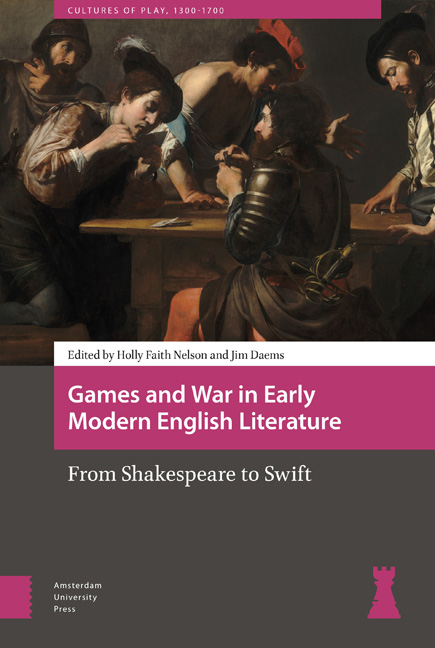Book contents
- Frontmatter
- Dedication
- Contents
- Acknowledgements
- The Interplay of Games and War in Early Modern English Literature: An Introduction
- 1 ‘Can this cock-pit hold the vasty fields of France?’ Cock-Fighting and the Representation of War in Shakespeare’s Henry V
- 2 Game Over: Play and War in Shakespeare’s Troilus and Cressida
- 3 Thomas Morton’s Maypole: Revels, War Games, and Transatlantic Conflict
- 4 Milton’s Epic Games: War and Recreation in Paradise Lost
- 5 Ciphers and Gaming for Pleasure and War
- 6 Virtual Reality, Role Play, and World-Building in Margaret Cavendish’s Literary War Games
- 7 Dice, Jesting, and the ‘Pleasing Delusion’ of Warlike Love in Aphra Behn’s The Luckey Chance
- 8 War and Games in Swift’s Battle of the Books and Gulliver’s Travels
- 9 Time-Servers, Turncoats, and the Hostile Reprint: Considering the Conflict of a Paper War
- Index
7 - Dice, Jesting, and the ‘Pleasing Delusion’ of Warlike Love in Aphra Behn’s The Luckey Chance
Published online by Cambridge University Press: 21 November 2020
- Frontmatter
- Dedication
- Contents
- Acknowledgements
- The Interplay of Games and War in Early Modern English Literature: An Introduction
- 1 ‘Can this cock-pit hold the vasty fields of France?’ Cock-Fighting and the Representation of War in Shakespeare’s Henry V
- 2 Game Over: Play and War in Shakespeare’s Troilus and Cressida
- 3 Thomas Morton’s Maypole: Revels, War Games, and Transatlantic Conflict
- 4 Milton’s Epic Games: War and Recreation in Paradise Lost
- 5 Ciphers and Gaming for Pleasure and War
- 6 Virtual Reality, Role Play, and World-Building in Margaret Cavendish’s Literary War Games
- 7 Dice, Jesting, and the ‘Pleasing Delusion’ of Warlike Love in Aphra Behn’s The Luckey Chance
- 8 War and Games in Swift’s Battle of the Books and Gulliver’s Travels
- 9 Time-Servers, Turncoats, and the Hostile Reprint: Considering the Conflict of a Paper War
- Index
Summary
Abstract
The dice game in Aphra Behn's The Luckey Chance transforms the play into a jest on the sex intrigue comedy as a genre. It thereby critiques the conventional transformation of sexual violence into a war game. This chapter argues that Behn highlights the complex forces that can lead to female infidelity by tying together the larger contexts of martial tropes in the game of love with the violence of masculinity, both sexual and economic.
Keywords: martial tropes and love in literature; Restoration drama; cuckoldry in early modern drama; sexuality and emergent capitalism
In the climactic scene of Aphra Behn's sex intrigue comedy, The Luckey Chance, or an Alderman's Bargain (1686), the worried old alderman Sir Cautious Fulbank, frustrated over losing £100 in a dice game to the ‘young Stallion’ Gayman, commits to a game-changing idea — he answers Gayman's next wager of £300 by agreeing to use as his stakes a night of sex with his wife:
SIR CAUTIOUS. […] Sir, I wish I had any thing but ready Money to stake […]
GAYMAN. You have Moveables, Sir, Goods—Commodities——
SIR CAUTIOUS. […] but if I had any thing that were worth nothing——
GAYMAN. You wou’d venture it,——I thank you, Sir,——I wou’d your Lady were
worth nothing——
SIR CAUTIOUS. Why, so, Sir?
GAYMAN. Then I wou’d set all this against that Nothing. (4.1.363-4.1.371)
Sir Cautious suspects his opponent has already been pursuing his wife, but neither man is aware that, just the previous night, it was Lady Julia Fulbank who had her servants lure the nearly bankrupt Gayman to her darkened bedroom, offering him gold she had stolen from her husband's counting house. Sir Cautious thinks his opponent is a Mr. Wastall, the name Gayman assumed when he mortgaged and then miraculously reclaimed his property from Sir Cautious—paying him with the proceeds he received the night before from Julia.
Gayman, a young and well bred, sexually adroit man of wit, is the sort of rake who critiques society's grosser hypocrisies and pleasurable pursuits, even as he revels in them.
- Type
- Chapter
- Information
- Games and War in Early Modern English LiteratureFrom Shakespeare to Swift, pp. 139 - 160Publisher: Amsterdam University PressPrint publication year: 2019



